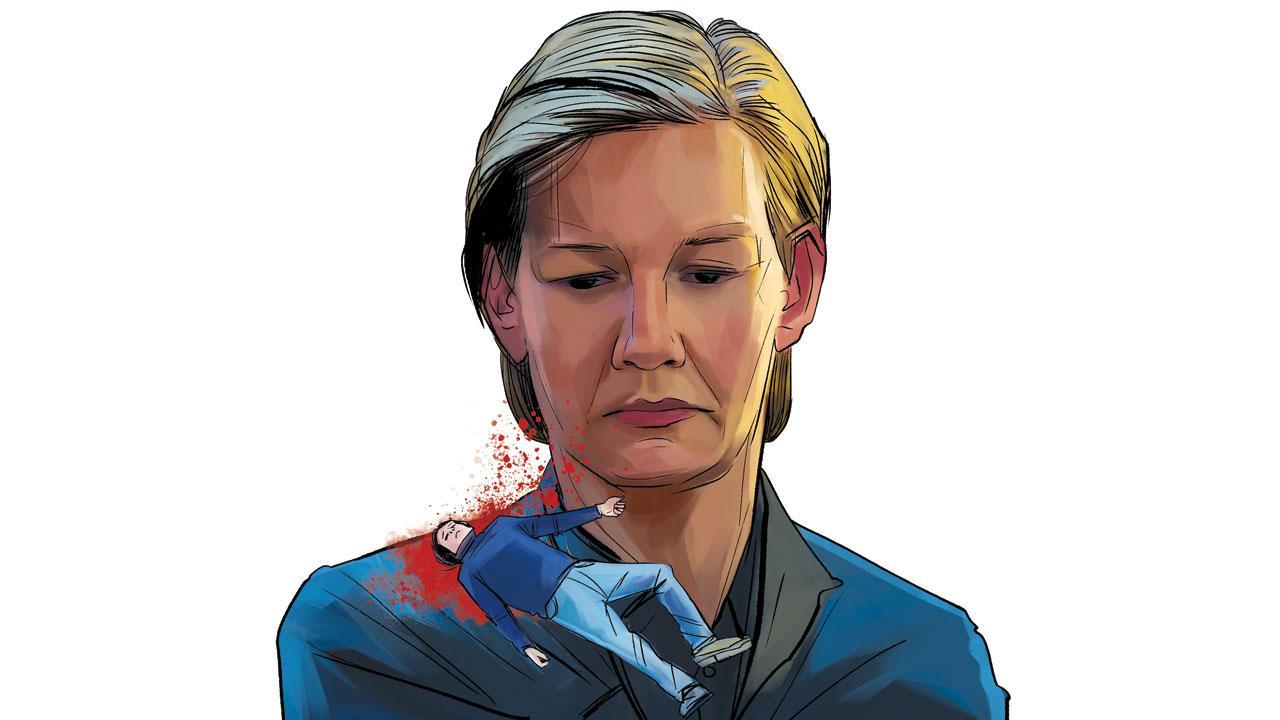While being a solid, nuanced, feminist autopsy of the institution of marriage, its format is a murder mystery that is as much a whodunit as a whydunit; a courtroom drama and thriller.

Illustration/Uday Mohite
![]() Justine Triet’s Anatomy Of A Fall is still in Indian theatres nationwide at the time of writing—glory be! It is rare for a film directed by a woman, that too a foreign language film (French), to earn five Academy nominations for Best Picture, Best Director (Justine Triet), Actress (Sandra Hüller), Editing and Writing- Original Screenplay—for which it eventually won an Oscar, for Justine Triet and her partner and co-writer Arthur Harari. Sweet revenge, as, despite winning the Palme d’Or at the Cannes Film Festival in 2023, France snubbed the film, sending another film as its official Oscar entry.
Justine Triet’s Anatomy Of A Fall is still in Indian theatres nationwide at the time of writing—glory be! It is rare for a film directed by a woman, that too a foreign language film (French), to earn five Academy nominations for Best Picture, Best Director (Justine Triet), Actress (Sandra Hüller), Editing and Writing- Original Screenplay—for which it eventually won an Oscar, for Justine Triet and her partner and co-writer Arthur Harari. Sweet revenge, as, despite winning the Palme d’Or at the Cannes Film Festival in 2023, France snubbed the film, sending another film as its official Oscar entry.
ADVERTISEMENT
The film is about how, on the death of an unsuccessful, aspiring writer Samuel (Samuel Theis), his grieving widow Sandra (Sandra Hüller) is immediately suspected as the murderer—especially because she is unusually unapologetic both about her success as a writer, and refuses to be her husband’s slave in the marriage, whether in raising their son or in keeping house. In India, she would promptly be branded a chudail, or witch, without trial; here, France has a legal trial, yet it reveals the same hammerhead approach towards women more successful than their husbands. While being a solid, nuanced, feminist autopsy of the institution of marriage, its format is a murder mystery that is as much a whodunit as a whydunit; a courtroom drama and thriller.
The film touched a raw nerve for me. From everything I’ve seen of relationships around me since decades, marriage is a ridiculously cheap and popular way—just one little mangalsutra leash and you’re done!—to get a free slave for life, who will look after her man, cook, clean and keep house, often earn her own salary, raise his kids, provide sex on demand, look after her in-laws, his grandparents, and more. #Sharetheload 50:50 is not even a theoretical discussion; not even fantasy or scifi, but a fiction as distant from reality as Pluto is from Earth.
Triet directs with an absolutely assured hand; her previous work includes films like In Bed with Victoria and Sibyl. Sandra Hüller (also in the extraordinary, Oscar-winning The Zone of Interest) is magnificent, walks the thin line between being cold and unapologetic about her success and her lack of interest in child care and household duties—and her honest frankness, including about her bisexual nature, her lying in court, that make you protective about her. Such is her unimpeachable integrity, she even tells her son, the blind Daniel, 11, to tell them like it is, knowing full well that she could be implicated. Samuel (Samuel Theis) and Swann Arlaud (her lawyer, the defendant) are good, but Milo Machado Graner does a fantastic turn as their blind son, 11, caught between warring parents—as does Snoop, their dog. The screenplay is the real hero, nuanced and taut, that keeps us guessing till the end: did she do it? The director is not telling, even though the case is resolved, so we haven’t travelled an inch, have we, in the near-half a century since Mrinal Sen’s Ek Din Pratidin (And Quiet Rolls the Dawn, 1979, Bengali), on the aspersions cast on a working woman, who didn’t return home one night? When Huller tells her lawyer, “I did not kill him”, he shrugs, “That’s not the point. You need to start seeing how others are going to perceive you.” In other words, people’s perceptions—or optics—are what count. More than the anatomy of a fall, the film is an autopsy of the institution of marriage. Samuel, an aspiring but unsuccessful writer, chooses to give up his teaching job in London, moves his family to a remote French chalet, insists on home-schooling his son, then, when Sandra is more successful as a writer, explodes with jealous rage, and is keen to be a saintly martyr, furiously gaslights her, trying hard to guilt trip her into doing more child care and housework, and blame her for his professional failure. Huller responds with confident and honest frankness, which makes the viewer protective, lest she be implicated.
In fact, their blind son Daniel, 11, trapped between quarrelling parents, and now responsible for the fate of his mother, shows far more emotional maturity than his age, acting by instinct, as does Snoop, their dog. They unexpectedly nudge the narrative towards justice in a way the deeply patriarchal, misogynist French courts cannot. Simon Beaufils’ cinematography keeps us in the thick of action; Laurent Sénéchal’s editing is effective. The producers are Marie-Ange Luciani and David Thion. The women crew include director and co-writer Justine Triet, producer Marie-Ange Luciani, costume designer Isabelle Pannetier and casting by Cynthia Arra.
Meenakshi Shedde is India and South Asia Delegate to the Berlin International Film Festival, National Award-winning critic, curator to festivals worldwide and journalist.
Reach her at [email protected]
 Subscribe today by clicking the link and stay updated with the latest news!" Click here!
Subscribe today by clicking the link and stay updated with the latest news!" Click here!







